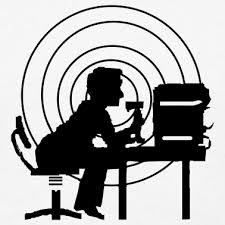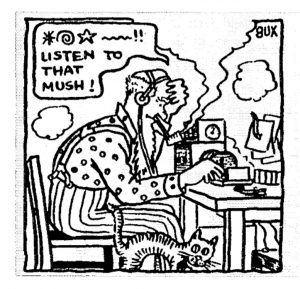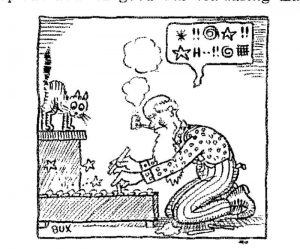
Friday, March 2, 2018 — To quote Monty Python’s Flying Circus, “… Now for something completely different.”
No ramblings today about the marvels of a 70-year-old Morse key rescued from the rubbish bin of history, or my latest adventures in retail therapy while sniping on eBay. Strap yourself in Bunky and tighten the straps, we’re officially going on a WAT — “Wild-Ass Tangent.”
 You probably have heard the ARRL’s proposal to the FCC about expanding HF privileges for Technician license holders. It isn’t just a narrow strip of HF here or there, but prime sections of the 75- and 40-meter phone band (i.e., 3900-4000 and 7225-7300 kHz, and 21350-21450 on 15 meters). The proposal also would give Tech license holders the same digital privileges as General Class licensees on 80, 40 and 15.
You probably have heard the ARRL’s proposal to the FCC about expanding HF privileges for Technician license holders. It isn’t just a narrow strip of HF here or there, but prime sections of the 75- and 40-meter phone band (i.e., 3900-4000 and 7225-7300 kHz, and 21350-21450 on 15 meters). The proposal also would give Tech license holders the same digital privileges as General Class licensees on 80, 40 and 15.
Now I know I sound like the stereotypical grouchy-ass ham who hates change and is still pissed at the ARRL over incentive licensing and the loss of the 11-meter Amateur allocation. I may be guilty of being grouchy, but my opposition to the proposal is, if nothing else, rooted in logic (from my perspective, of course!).
THE HORSE IS OUT OF THE BARN. The ARRL is trying to correct a problem it tried to fix when the FCC moved to lower and then drop the code requirement. CW was a “barrier” to entry into ham radio, and yes, the numbers of ham increased once the requirement was dropped in 2007.
The Tech license was already the de facto entry level license by then; the FCC quit giving Novice ticket exams in 2000. The current proposal is an attempt to correct what that change created — thousands of new hams who had damn little incentive to learn about operating on the HF bands, and even less HF experience.
To the league’s credit, it petitioned the FCC to reconsider the licensing structure when the code requirement was dropped; the FCC refused. So we all agree the Tech license was a crappy entry level because it did not give new hams real experience with HF.
I don’t have a problem with all of the so-called “HT hams” in the Amateur service. VHF/UHF privileges are indeed the main draw for thousands of hams who have earned their tickets. I’ve helped my share of new hams get their Tech tickets through license classes and serving as a volunteer examiner.
So what’s my beef? Its easy to complain, but I fault the ARRL for failing to get this issue addressed.
Yes, I know — “woulda – shoulda – coulda.” Hindsight, blah blah blah. Next?
 BARRIER? WHERE’S THE BARRIER? The ARRL has long discussed changes to licensing to reduce or eliminate “barriers” to licensing. The 20 wpm code requirement was indeed a barrier for me, though I’m convinced I still would have passed that requirement in time (I passed the 13 wpm test without a hitch). The lack of meaningful HF privileges is cited in the ARRL proposal as a reason for the changes.
BARRIER? WHERE’S THE BARRIER? The ARRL has long discussed changes to licensing to reduce or eliminate “barriers” to licensing. The 20 wpm code requirement was indeed a barrier for me, though I’m convinced I still would have passed that requirement in time (I passed the 13 wpm test without a hitch). The lack of meaningful HF privileges is cited in the ARRL proposal as a reason for the changes.
I’m concerned about the proposal giving 378,000 Tech licensees instant access to prime portions of 80 and 40. It would — with one FCC action — more than double the number of hams with access to those portions of HF phone and digital bands. The potential to flood the phone bands with new users is worrysome, but turning that number of HF newbies loose on the CW/digital bands is a scary proposition.
One of the advantages of the old Novice license was how it introduced new hams to the technical and cultural aspects of HF operating. You learned of the subbands on HF, you listened to HF, you learned by example (hopefully good examples, hi). Most Tech licensees lack that experience unless they operated on 10.
But where exactly is the barrier that prevents Techs from getting on HF? The only barrier is the General license exam, and is not a highly technical or difficult exam. Is it too much to ask a Tech licensee to upgrade? The proposal means existing Techs won’t have been required to study rules, regs or operating practices before using any new privileges.
Boy, sounds like my Grouchy Old Ham filter is in top condition, eh?
The “refarming” of the CW subbands some years ago greatly reduced the CW portion of 80 and also reduced the 40 meter CW subband. I know it won’t happen, but it would be worthwhile to consider giving those 378,000 potential additional HF digital users more room to operate. Because of seasonal and propagation challenges on 80, I would expect most users to gravitate to 40, which offers better operating conditions.
MY PROPOSAL: ARRL BOD, DO NO HARM. Actually, my suggestion is for the BOD to withdraw its proposal. If the ARRL wants ham radio to play a role to promote Amateur Radio as part of STEM education, if they want younger hams to get involved in new, cool, digital modes, I suggest to you there’s truly little standing in their way. It just isn’t that tough to upgrade.
 Instead of giving away the HF bands, consider this: Revise the General license exam and focus on making it meaningful as an incentive to learn about HF operation. I’m not suggesting making it necessarily more technical, but meaningful. Here’s an example of what I’m talking about.
Instead of giving away the HF bands, consider this: Revise the General license exam and focus on making it meaningful as an incentive to learn about HF operation. I’m not suggesting making it necessarily more technical, but meaningful. Here’s an example of what I’m talking about.
G2E07: What does the abbreviation “RTTY” stand for?
Does it really matter what the abbreviation RTTY stands for? Or CW? PSK? No. Period.
I contend that Amateur Radio tests actually evaluate how well you can parse multiple choice questions and less about knowledge of the content. Yeah, another Grouchy Old Fart observation, but that doesn’t mean it isn’t a valid conclusion.
In summary, the Zed Man’s proposal: Revise the General exam so it is an incentive to learn practical HF operation. And let’s consider eliminating (or at minimum, streamlining) the Extra exam. When’s the last time you had to calculate phase angles, reactance, or explain a bi-stable circuit? You may accuse me of suggesting that we “dumb down” the exam; I contend that the Extra’s super-technical content does nothing to further or improve Amateur Radio. Instead, the technical-but-little-used content areas it tests serve as a very real barrier for those who wish to fully access Amateur Radio spectrum allocations.
REMEMBERING HARA ARENA. If you want to see some sobering sights, do a search on YouTube for Hara Arena, and you can check out how the home of the Dayton Hamvention has deteriorated since Hamvention left. You also can also get an appreciation for just how big the place is, and how much of it we never saw during Hamvention. Sad to see, but fascinating too.
